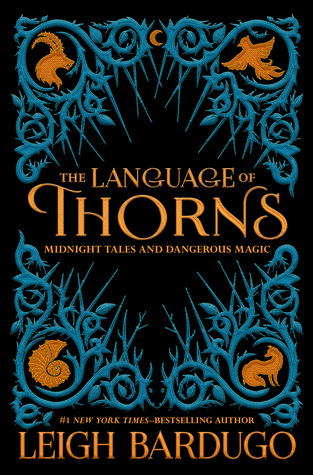Ayama and the Thorn Wood
A monstrous son is born. A king builds a maze to keep him trapped. Yet, he escapes.
The village people suffer and no one is able to stop the monster.
A family ashamed of one of their daughters sends her to be a messenger with the beast in hopes that they'll become rich and the monster will stop terrorizing the town, or at least be rid of their daughter.
Ayama is the main character of this opening short story of The Language of Thorns. She's a girl who wasn't born as beautiful as her sister and is therefore ostracized by her family. She is treated like a servant, forced to sleep in the kitchen, covered in ash and responsible for all of the chores. She's silenced by her family until she almost forgets how to speak. Yet, she's the only one in the village who will try to face the beast, speak to him, and try to save the town. It's when she reaches the monster that her voice is revealed, as well as her sharp tongue, quick wit, and honesty. The fact that these character traits are all revealed under duress show Ayama's bravery and courage. It also shows that these traits can be found in unexpected people. It reminds me of the old adage, don't judge a book by its cover. Because we can't judge a person based on their looks. It's their personality, their characteristics that matter. Just as Ayama proves in this short tale.
When she arrives at the wood, the beast demands she tell him a story in exchange for her life. She adds truth to a fairy tale and he lets her leave unharmed, promising to leave the town's livestock alone. Her family is rewarded but Ayama is still treated like a servant. No one cares about her, only about their own freedom from the monster. Until it seems that he has returned to continue his terrorizing. So Ayama is once again sent to the woods.
She once again must trade a story for her life. She again adds truth to a fairy tale and survives, saving the village yet again. A village that didn't care for her. A village that was too afraid to face the monster a young girl could face. But saving the village wasn't enough for the King. He sent her back to the monster with a specially crafted knife with orders to kill him. Ayama returns and tells him another story and she finds out the truth behind the King's accusations and the village's torment.
In the end, truth prevails and the true monsters of the story are punished while those who look like monsters, but aren't, are rewarded. This opening tale of The Language of Thorns sets the tone for this collection of short stories as honest and representative of the cruelty sometimes found in leadership, the selfish nature of humanity, and that things aren't always as they appear. Though this story had a happy ending, we'll see if that continues over the next few weeks. The power of this opening story has me really excited to see what power the following stories have.
My favorite part about this short story is that Ayama saves her own life by telling a story, a fairy tale, but with truth added to it. And by truth, I mean realistic outcomes. She removes (part of) the fantasy of the fairy tale and exchanges it for something she has learned from her own life. This adds a sadness to the story but also twists it to make it true for the monster. This act gives the story, and the art of storytelling, power. It demonstrates that sometimes storytelling, or sharing, can provide peace and save a life.
Next Week: "The Too-Clever Fox"




No comments:
Post a Comment